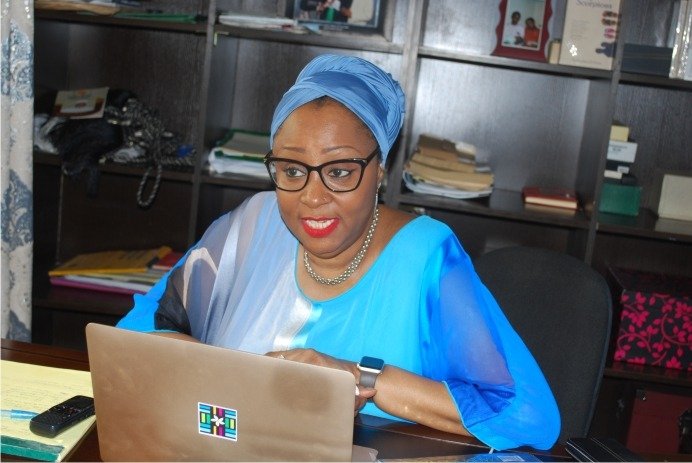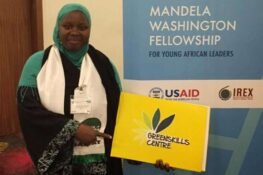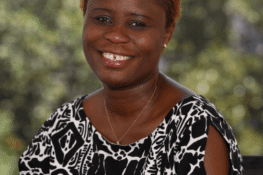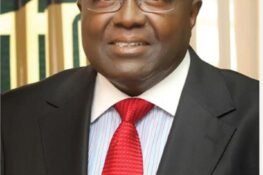The First Lady of Kaduna State, Hadiza Isma El-Rufai, fielded questions ranging from her professional practice as an architect to her passion as a writer, her role as First Lady and – wait for this – her concerns about her husband! Once you start reading, stopping will be difficult.
Moving from Architecture to Creative writing must have been quite a major leap, how did you achieve that?
Well, I guess it is a leap. You know, but I think creative writing and writing is something I have always wanted to do. I am happy I have the opportunity to do it. I enjoy practising architecture but I think this is the right time for me to make a change.
How did you achieve the change?
I started in 2008. I had a lot of time on my hands and it was a difficult time for me. So, I started by reading novels again. I used to read a lot of novels but for some years I had stopped. You know how life is; you have children, school fees, work, everything, you know. So, when I started reading, I remembered that once upon a time, I said to myself that I would write a novel someday. So, I said let me just try because I had a lot of time on my hands. First, I enrolled for an online creative writing programme. My tutors encouraged me and I started writing. And then I realised that I might as well do an MA so I could really know the craft of writing. So, I enrolled to do an MA at the Berth Pa University in the United Kingdom.
Which year did you do your MA?
I started in 2010. It was a one-year course.
You said something earlier about that period being a difficult one for you; can you shed more light on that?
You know my husband is a politician and he had served as a minister of FCT under Obasanjo’s administration. When their administration ended, Umaru Musa Yar’adu came on board and my husband had a lot of problems. He had to leave the country basically on self-exile and I went with him to the United States and I had nothing to do. That was when I started reading more, because I had a lot of time on my hands.
The title of your book, “An Abundance of Scorpions”, paints a scary picture but it turns out to be a fascinating story of a resilient woman, Tambaya, who maintained a strong character in spite of her challenges. What inspired the book?
Hmmmn…Actually this story happens to be as a result of a back story I was writing in the first novel I was writing. I don’t know if that makes sense? I started writing a story of an orphan boy, that was growing up in an orphanage with a matron that was his aunt but he didn’t know that. So, because I was writing the back story of the matron why she did what she did, I realised that it was a lot and that I could make a novel out of the matron’s story. That was how it came about.
The theme of the story has to do with women taking charge of their lives, even if they had husbands, do you in anyway see yourself in the story?
Yes, I think so. I think all of us – every woman – should see ourselves in that way. As I have said before, if you have a husband it is well and good if he is able to take care of all your needs. But even if that is the case, I think you should always try to do something for yourself. Whatever is yours, I think, it is yours however small it is. And you never know what can happen. Like in this story, anything can happen and you find out that your circumstances change. If you are not doing anything, you will be completely devastated. So, it is always good to prepare for the worst and hope for the best.

As a ‘First Lady’, is there anything you are doing or planning to create an enabling environment for other Tambayas out there?
There is something I am doing. But I wouldn’t say I’m doing it in my capacity as a First Lady. I have this foundation, Yasmin El-Rufai Foundation, which I started in 2013 and that was before my husband was governor. So, it was not because I am the first lady. Incidentally, we have two programmes that we concentrate on; there is a creative writing programme for the children and we also have the women literacy programme. The women literacy programme is what I think is relevant to your question because what we are trying to do is to improve the literacy skill of women in northern Nigeria. This is empowerment of some sort, because I believe that once you give women literacy skill, the sky is the limit. In the world today, you have all the information on the internet but if you are not literate and able to access that information then it is useless. So, what we do is that we target dropouts; young women who have dropped out of school as a result of so many things. You know some of the factors; sometimes, it is early marriage, sometimes it is pregnancy, sometimes because the family cannot afford to educate the girls and the boys and they choose the boys to educate. So, the people we target are young women who have had some education. We don’t deal with those who do not know anything at all. We now enhance what they know to make them become more literate and also improve their self-confidence so that whatever they do even if they were involved in buying and selling they will have the confidence to market it to other people. Basically, that’s what we do. When they graduate from the literacy programme we send them for skill acquisition, but we don’t do skill acquisition, we have partners who handle that so we outsource that to them. There is photography, bakery and one other thing. They choose what they want and we sponsor them but we don’t run the skill acquisition programme.
What kind of impact do you think you have made so far?
I think it’s been good so far. However, the resources are not adequate. If I had the resources I need I would have opened centres in all the local governments in Kaduna or even in all the northern states. But so far, what we have is what we use. We are working with the resource of those funding us to achieve what we have achieved so far. We certain people who fund us like the Dangote foundation and some other private organisations. We have four centres and what we did when we wanted to start was to go to community leaders and work with them. We could only do about 20 women per centre at any given time. But we find that we have hundreds wanting to come.
So far, how many women have passed through the literacy training?
So far, only about a hundred and they did very well.
How do you manage the roles of a first lady and that of a writer?
Well, you have to juggle. You have to juggle for almost everything in life and there is never enough time. There is never enough time. So, you have to manage. So, I do my foundation work. I go to the office whenever I am in Kaduna. I do my writing early in the morning. I don’t do much writing as I would like to honestly because of my commitments.
Your foundation is not tied to your being the first lady, which also means you intend to continue even after your husband leaves office. Does that also mean that you don’t have any pet project as it’s customary among Nigerian first ladies?
No. I don’t.
How has your book been received since it was published in 2017?
Oh it has done very well. The publishing industry in Nigeria is new. Recently my publisher said we have sold over 2000 copies which is a lot for Nigeria.
Let’s go back to the book, it has to do with standing up for women, what are those things holding women back from reaching their full potential?
Well, I will say there are so many things. Basically, we stand at a disadvantage because of cultural beliefs. We are brought up to believe that our role is to support the men. Any woman that wants to come out there finds out that she gets castigated. Some even accuse women of being wayward when she decides to go into the political arena. So, I think it’s a culture which we should all continue to fight to see it change. Sometimes also, the challenge is within us – our mindset. Like I said, we already have that belief that that is our role. Recently I was at a conference where they were discussing the role of fiction in changing the perception of women in leadership. I think fiction is also important because most of the time, when you read fiction, you see the role that women are given. You don’t see women in positions of power. Hardly would you read a novel or see a film where a woman is the president. Or in a family where the man does the cooking, changing of baby’s napkins. So, we perpetuate this culture. And when you grow up like that, it is the same thing with our boys. That’s why our boys tend to think they have to do this macho thing, cooking or changing napkins is not for them. That’s the culture. So, we have to change that because there is nothing wrong with a boy cooking. And also, the way we bring up our children, we should bring up our boys in a fairer way. Because you will find out that we always want the girls to do the cooking, cleaning and serve the boys. Is that fair?
What do you think is the role of woman in the society?
The role of the woman should be whatever a woman wants her role to be. I don’t think we should apportion that this is the role of this specific gender. If we find a man that wants to be a house husband and if it works for the couple it is OK because it is only about them. It is not anybody’s business. So, the role of the women should be what she wants it to be. There is nothing wrong in a woman wanting to be a house wife, a mother of her children; it is perfectly alright if that is what she wants. But, at the same time, there is nothing wrong with a woman having the ambition to become the president of Nigeria if that is what she basically wants to do it is equally valid. Basically, what I want to say is that it’s about choice; women should be allowed to make their choice and people should respect that choice.
Do you see the sharia law especially as regards to inheritance as unfair to women?
Hmm.…I would have said it is but as a Muslim, we have to accept what the sharia law says. And I can understand why those things were put in place. We are talking about roles assigned long ago. You know the woman even if your parents die, the brothers will take of care of their sisters. So, it makes sense to have him have more than the woman because whatever the woman has is for herself but the brothers will feel like they are they head of the family. But these days, in some cases, we find out that the women are the heads of the family. I don’t think it for us to try and change what they Sharia law stipulates. It is for us to accept it.
How do we now protect the women even within the law that cannot be changed?
I think sharia protects the women, that are within what is stipulated, because people adhere to it. You can say it is not fair or whatever. But, like I said, accept it but within that acceptance I can assure you that… that’s why in the Muslims premise we hardly have issues over inheritance because it is stipulated. Fine, saying whether it is fair is a different thing. But everything is stipulated. And nobody violates it. When somebody dies, there is a way inheritance is shared; the boy will have two-fold and the girl will have half. Nobody will take it from her. So, the woman is protected in having that her half. Even if it unfair, she will get her half of what the boy gets. Nobody will contest that. But to say somebody will say, ‘you are a woman you cannot have anything’, no it is not like that.
I know that you founded Yasmin foundation in memory of your late daughter and that in 2014 you also lost a son. How did you find the strength to carry on?
Well, it is difficult. But what helps me is the knowledge that my children would have wanted me to carry on. They wouldn’t have wanted me to just crumble and fall apart, and of course, I have other children that look up to me. When these things happen, they happen and there is nothing you can do to change it. What you can’t change you have to accept it. I don’t know if you know about the serenity prayer….
I know…
It is very good. It is very true. You should pray to have the strength to change what you can change, accept what you cannot change and the wisdom to know the difference. This is because you can be there fighting trying to change what you cannot change. So, that prayer is very good. Because there are certain things you simply cannot change.
To many people being a First Lady must be filled with glamour and glitters, is that so for you?
(Laughs) There are certain advantages but also there are certain disadvantages, especially because I don’t like being in the public eye. But I think if you are politician or you are married to a politician there is really nothing you can do. Everybody wants to be in your business, people can say whatever they what to say. It comes with the territory. But there are advantages as well. There are certain doors that are open for you. So, it is OK. You take the good and the bad.
Many see your husband, Governor Nasir El-rufai, as a non-conformist with a penchant for anti-peoples policy, does that ever worry you?
First of all, I don’t agree with that; I don’t think he has anti-people’s policies. I think he (Governor El-Rufai) is the exact opposite. I also know that once he believes in something, he goes for it regardless. So, that’s strength. But if you are in the political terrain people like you to be a bit more flexible. But he is who is, we are who we are. As long as he has a good intention, that’s fine.
So, you are not bothered?
In the beginning it used to bother me because I don’t like hearing his name always in the news. But with time, I have grown a thick skin. (Laughs).
Do you see yourself as a feminist?
It depends on what you are saying. You know people always talk of feminism, feminist, but you know we don’t all have the same definition of what it is to be a feminist. My own definition of a feminist is for a woman to be able to make her own choices by herself. It is not that a man should tell you this is who you will marry, this is what you should study, and you need to always sitting at home. I just want women to be able to make their choice and for men to accept it.
But that’s feminism…
No. to some persons, they say it is equality between man and woman. I don’t understand what they mean by equality…
Equality in the sense that women can make their choices…
Well, I don’t know what they mean by equality because we are different. Men and women are different. There are some certain things that I can do that a man can never do. So, in that sense I am superior to the man.
But does equality mean men and women are the same…
What does it mean?
It means equality of right to choose. No one should oppress the other.
Yeah. We should be able to make our choices for ourselves. Because I am a woman you cannot say you want to make decisions for me. No.
What is your view on increasing fatal domestic violence in the country?
It is very serious. I don’t know maybe it is increasing. Or maybe people are more willing to talk about it in the social media, because this thing has been going on for a long time. But it hasn’t been brought to the forefront. Let’s even say it is increasing, whether it is increasing or nor, it is really a source of concern. There are so many things that are changing in the society today which could be a factor. You know things are not so easy economically, and when somebody is frustrated he can decide to be violent. There is also the issue of drug addiction which and all the issue of dug taking in the society. All those things are factors that may be responsible for increase in domestic violence. I am glad that this issue is in the forefront and there are NGOs that are willing to assist in such cases. But unfortunately, a lot of the times, people are willing to help say when they talk to the woman and they want them to leave or report, the same women will not have the strength and will keep going back.
While we keep on saying ‘Leave to Live’; leave so that you can live, we also know that there are all kinds of cultural and economic issue that keep these women from leaving to live.
You are right on the cultural and economic issues. The cultural issue has to do with unmarried women; so a lot of women do not want to leave their husband to avoid that stigma. But I think we have to try and just overcome that. We have to help ourselves because nobody will help us. We should be able to say, “I don’t care”. But the one I see, which is even more important, and I think that’s what applies to a lot of the women rather than the cultural thing is the economic factor. A woman needs to be financially independent. Some of them want to leave but they don’t have where to go. Everything they have is given to them by their husbands. They have nowhere to go and also the law doesn’t help us in Nigeria. You understand, if you want to go, the man can say you can leave but you can’t go with my children. Sometimes because of that the woman does not want to leave. So, there are certain laws that we need to put in place and I wonder what our members in the National Assembly are doing. Sadly we just have very few women and you know we need a critical number of women to drive these issues. You know we need to make laws that will be helpful to the woman in terms of child custody and alimony in case of marriage break-up. But we don’t have those laws in Nigeria. In Nigeria today, a man can just tell you to go, he will even throw your bags out and you will not get justice anywhere. So, these are the kind of things women look at and say, ‘let me stay’. Nobody is going to help you. My children will be taken from me, I don’t have any money. So basically what we should concentrate on is to make sure that our women are educated and empowered economically.
In the last administration we had quite a large number of women in elective and appointive positions, but last election that eroded some of the gains. What do you think we can do to reverse the trend before 2019?
Honestly, I have no idea what happened. But it is really sad that we have less number of women rather than having more women. I think we should be looking at a situation where we have 50 per cent, because population wise we have 50 per cent…
Even the 35 per cent affirmative action we don’t have, I think it is about 20 per cent now….
It is not up to 20. It is only about six per cent we have or whatever. So, it is not good enough. Honestly, I don’t know what happened between then and now. Maybe it’s because of money politics and you know we women don’t have money.
Some union members, especially the teachers’ union, are very upset with the changes your husband is making. Do you think it might cost your husband’s his second term ambition?
I really don’t think so. I think there is too much importance given to civil servants. Teachers are important, alright. You know usually you find the whole country will go up in arms about minimum wage and they forget that there is a large number of people outside the formal sector. What is the percentage of civil servants in Nigeria? But everything is to do with civil servant this and that. But, I do not think it will cost my husband his seat. I don’t think so. Because I think the people that matter know what it means. The ones who are aggrieved are probably the teachers who were not qualified and were asked to go. And a lot of people who were against it were so out of sentiment. They said this is where they get their daily bread. But that’s not the issue. The issue is, are they teaching our children what they are supposed to? First of all, do they have what it takes to teach our children? It is not about sentiments. Not at all. It is not a charity. It is like a contract. You give me something I give you something. That’s the way it should be, but I know we are full of sentiments. But I think my husband in the first place said he doesn’t really care, he doesn’t have to come for second term. But he must do what he believes is right.
Will you campaign for him for a second term?
Of course.
Does the First Lady have any influence on how the state is run?
No. Not this First Lady. I don’t know how it works in other states. You know the states are autonomous and it depends on what the governor wants. He can decide to give his wife a role but not in Kaduna State.
Are there some things that worry you about his politics?
Well, I’ll say sometimes he is too upfront and honest. You know in politics they say you have to be political. Politicians have to be diplomatic. Lie here, lie there. May be that’s the way to be safe.
Has anything changed about him since he became governor three years ago?
No, I don’t think so. Nothing much. It is just that he doesn’t have time for family now, he is too busy. You know this work is not easy.
When should we expect your next book?
Like I told you, I hardly have time to write but I will try. I hope latest in two years. (Laughs).
Are your architecture days over?
Yes, I won’t practise architecture.
Why is that?
With all the things I have to do then I have to add that. Ok, maybe another time.
But we want more women architects
There are quite a number. Maybe not many as we would want.
So it is over?
Yeah.
What motivates you, what drives you generally?
What motivates me? I don’t know what I say will motivates me. In terms of what?
What makes you look forward to the next day?
What makes me look forward to the next day is because at this time in my life I am doing exactly what I want to do and I am happy doing it. I find that I am always up early ready. You know, if you are not doing what you enjoy, even if you are earning a lot of money for it, you will find you are reluctant. But if you enjoy what you are doing, you know they say thank God is Friday, but me I say thank God it’s Monday because I want to go to work.
Does it mean when you were practising as an architect you were not enjoying it?
I enjoyed it.








